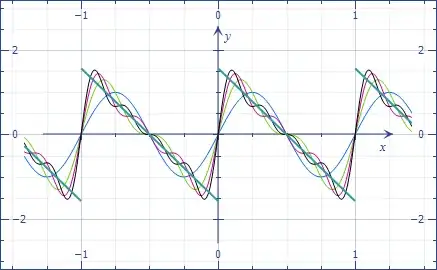I'm trying to find the value of $\mathbf S$ where
$$\mathbf S = \sum_{k=1}^\infty \frac{\sin(2\pi k x)}{k}; k \in \mathbb N, x \in \mathbb R^*, x \not \in \mathbb N$$
I had a look to WA which lead me to this result.
I think this result can be simplified. So I did some research and some hours later, I found this result:
$$\mathbf S = \pi (x+\frac{1}{2}-(2n+m)) ; n,m \in \mathbb N$$
I'm not satisfied with this result either. I think I miss something on the way.
I'm stuck. What is the result of this infinite sum?
